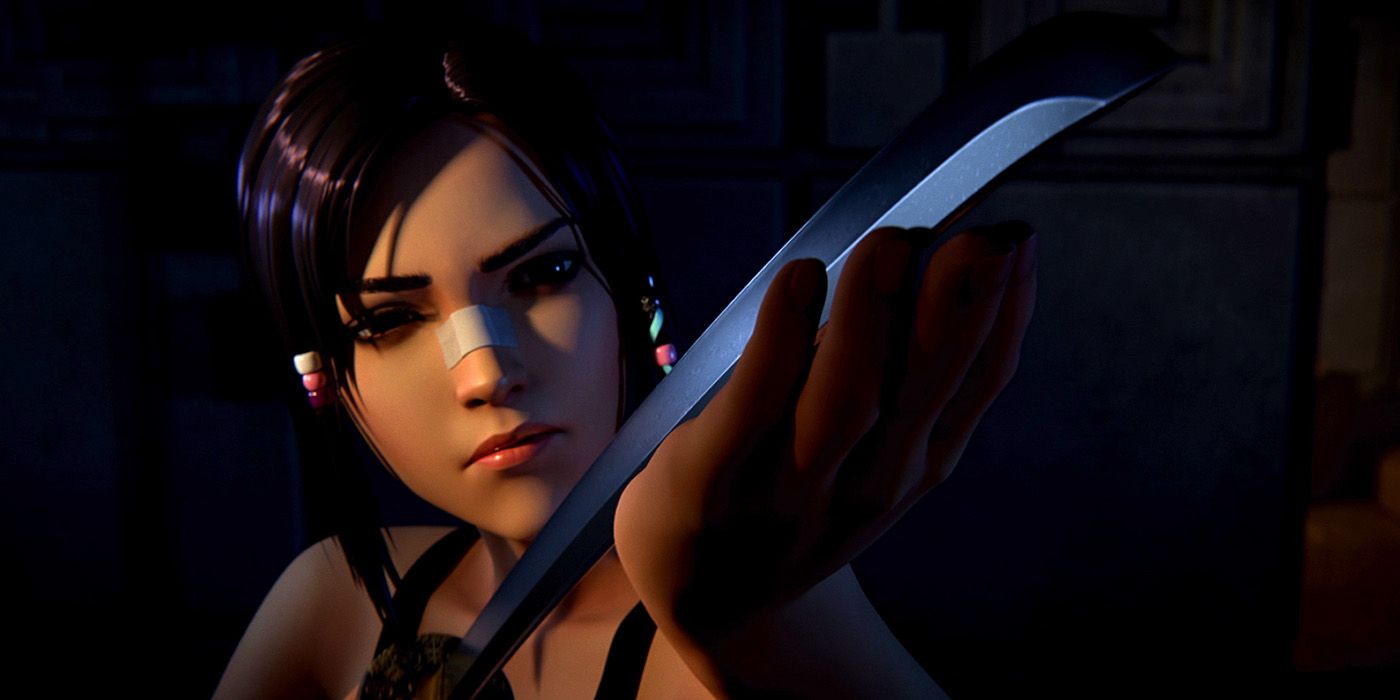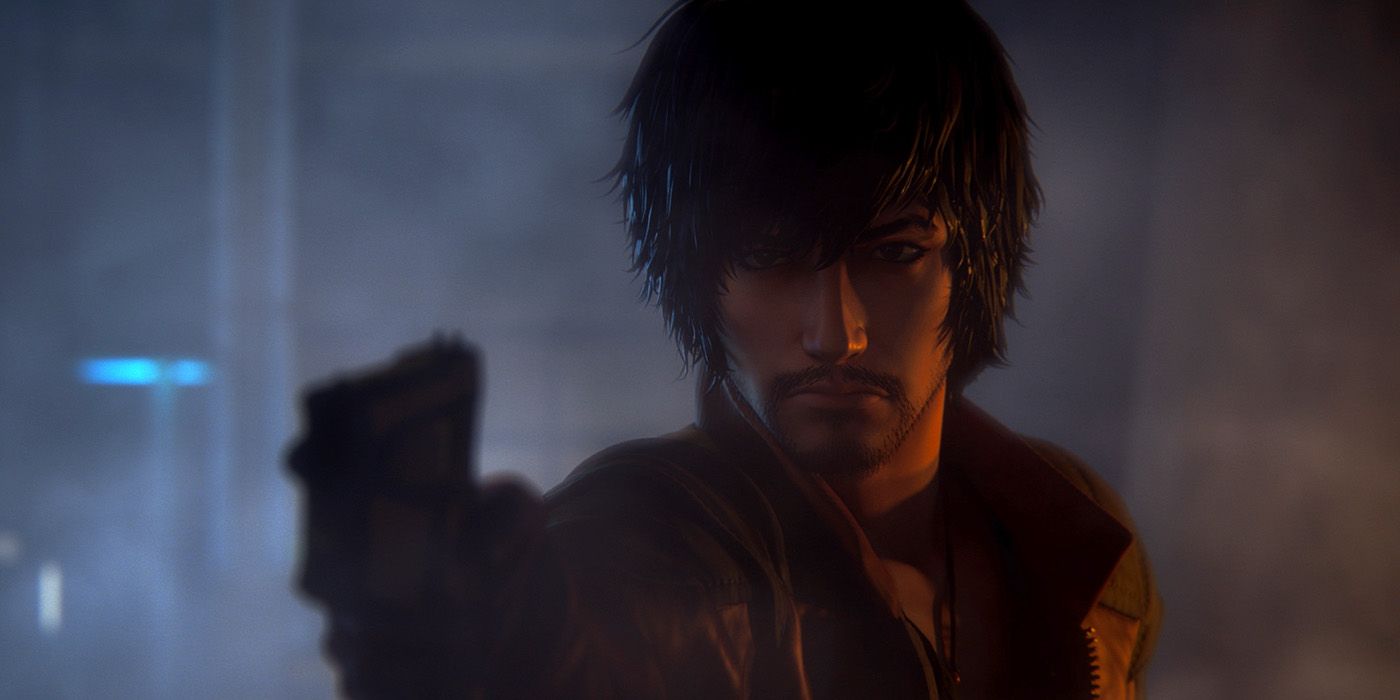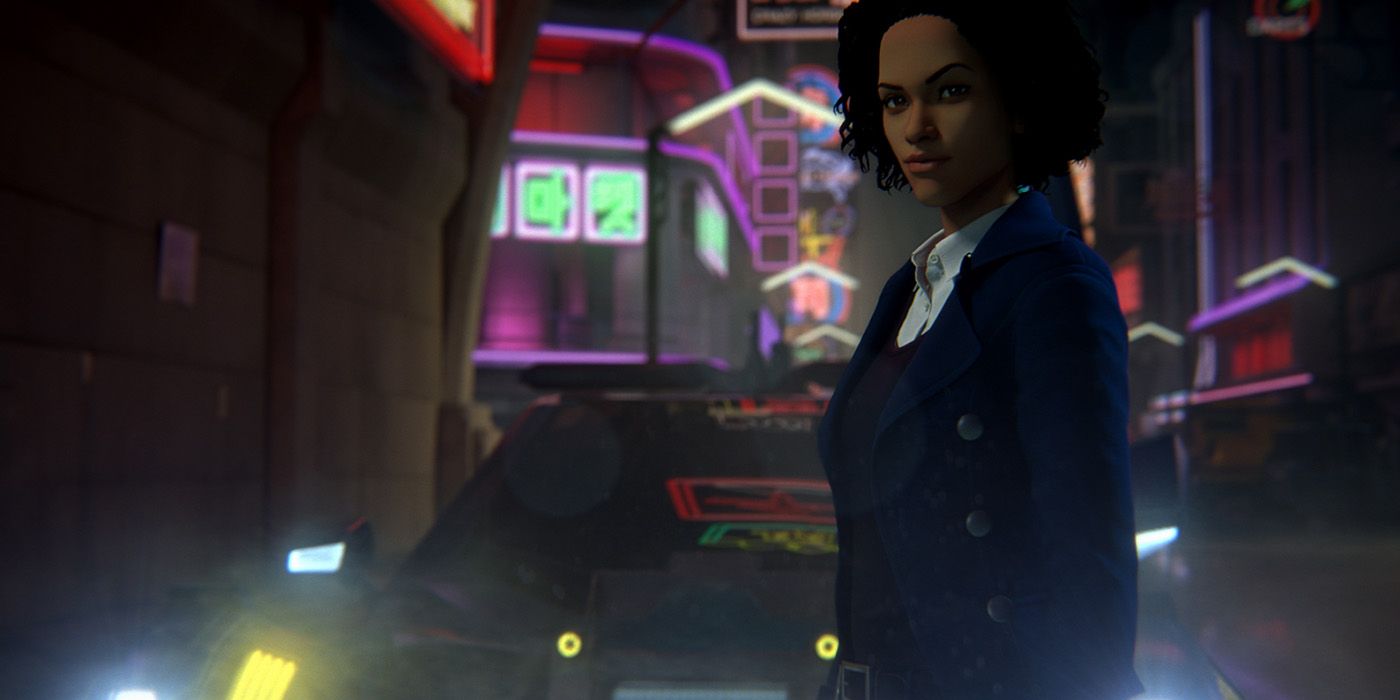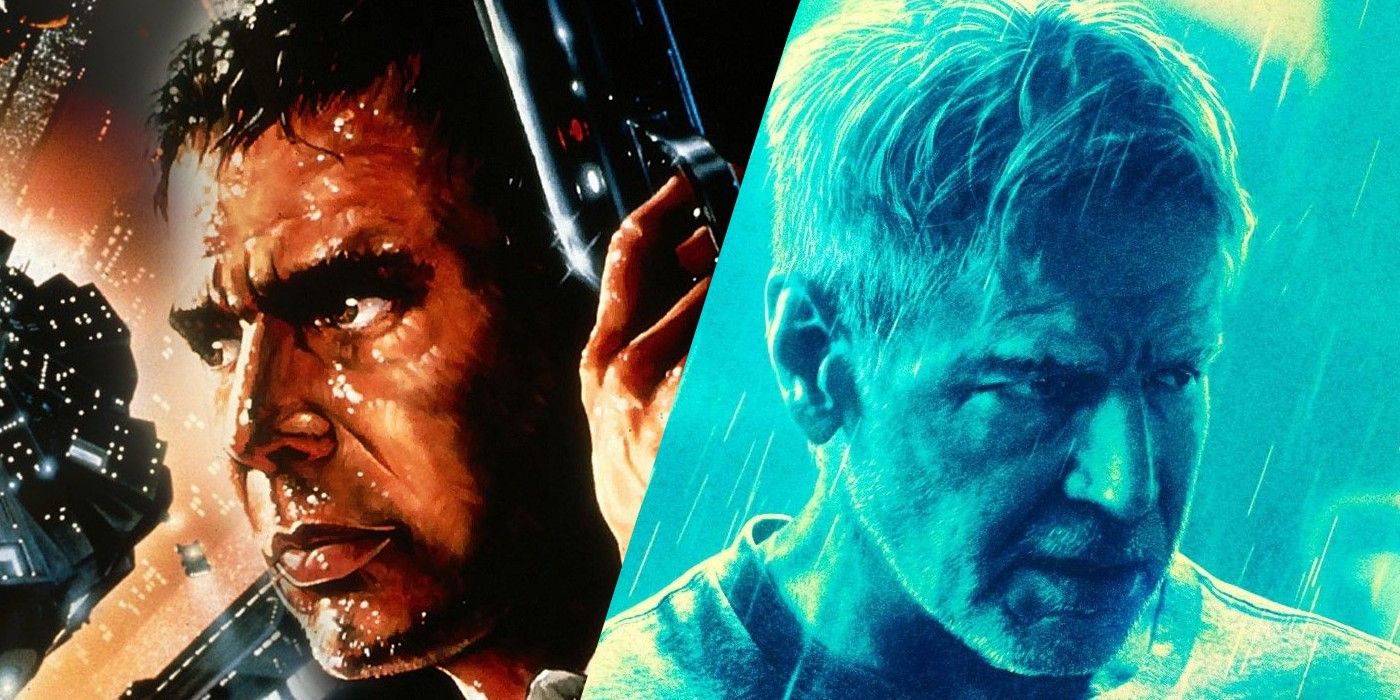The world of Blade Runner is expanding with the animated series Blade Runner: Black Lotus, bridging the iconic 1982 film and its 2017 sequel. The show centers on the amnesiac Elle who seeks to learn the answers behind her lost memory and whether she is truly a replicant in Los Angeles, 2032.
In time for the show's premiere, Screen Rant participated in a press conference for Blade Runner: Black Lotus and spoke with stars Jessica Henwick, Will Yun Lee, and Stephen Root to discuss joining the iconic sci-fi franchise, working on the series during the COVID-19 pandemic and which Blade Runner film they like best.
Jess, your character Elle is the first female protagonist in a Blade Runner story, can you talk a bit about your character and that significance for the franchise?
Jessica Henwick: Yes, I play Elle and she is a young woman who wakes up with no memory of her past and the only clue she has is this black lotus tattoo on her shoulder. The show really follows her trying to piece together who she is and why so many people are out to get her.
It's a huge honor to be the first female protagonist in the Blade Runner universe. I'm such a big fan of the previous films and I love the tone. I was just saying earlier, you can't quantify how much of a pop culture moment this was and how much it changed the landscape. So I feel very, very lucky to be a part of it and to be able to bring a female protagonist to it.
Were you able to see the Japanese dub of the show first and draw from the portrayals of your characters by the actors or did you invent everything wholesale?
Jessica Henwick: I may be wrong, but I think we're the original language for the show, I think they animated to English and then dubbed it to Japanese, if anyone from Crunchyroll is here, feel free to jump in and tell me I'm an idiot. [Laughs]
Stephen Root: I think that's correct.
Jessica Henwick: But because of the scheduling, sometimes the Japanese actors would go in before us, or sometimes we would go before them, and sometimes you would hear a scratch track. Often it wasn't the actress or the actor actually playing that role, it would sometimes just be someone from the office or Wes Gleason, who is our voice director in L.A. Sometimes they put his voice in, so definitely you would hear what they were doing and know that's what they wanted.
Stephen Root: Because that this was recorded during COVID, you were kind of in a bubble by yourself anyway, but everything for me lately has become, "Is it a good script? Is it people that you want to work with?" This was a tremendous script, and just seeing bits and snippets of the animation made me want to be part of this world. Obviously, I loved the movies beforehand and had seen the 10-minute short for the 2049 movie and that was all exciting. But to draw from it, it's mostly just from the script for me because we didn't really get to interact while we were shooting it or recording it.
Will Yun Lee: I think for me I remember shooting an episode and then I came back and shot the entire episode again just finding the character. It was an amazing team between the directors, Wes Gleason and Joseph Chou, how to bridge the gap between Japanese and American sensibilities and also Blade Runner itself. I've done a lot of projects where Japan might be the source material and you get such a rudimentary translation.
Because all three parties, from Joseph to Wes to [Shinji] Aramaki-san, had this one understanding of Blade Runner and Joseph was amazing, he was one of the producers. He could speak Japanese, he can speak Korean, he can speak English, it was seamless in terms of direction. So even if one of the directors had a note and they would tell Joseph in Japanese, somehow I feel like Wes understands Japanese. [Laughs] He may not, but he would get exactly what the directors wanted, and then he would articulate it in a way that that would be very nuanced for us.
Stephen Root: For us, it was incredibly important to get the correct tone of what everybody else wanted to do, so we relied tremendously on him.
Blade Runner has such a legacy in its own franchise and inspiring other films, namely in the cyberpunk genre. Will you were in Altered Carbon and Jessica is in The Matrix Resurrections. Having been part of these worlds before, what do you think it is about the world of Blade Runner that is so engaging and draws people in?
Will Yun Lee: Altered Carbon felt like it started from the basis of Blade Runner because I remember walking onto a set piece and I was like, "Wow, I feel like I'm in Blade Runner." They drew from the steam coming from the ground, the neon lights, the mix of cultures, it bled through so many pieces of Altered Carbon. It felt like a familiar world because I'm such a fan of Blade Runner itself and then to actually be able to touch things and see they'll have little like night market stands in Altered Carbon, I was like, "This feels like Harrison Ford should be popping out at some point during this scene."
Jessica Henwick: Well, first off, I actually came to Matrix much later, we recorded Blade Runner a while ago. What's the everlasting appeal? I mean, it's so many things, it's tone; it looks cool, it sounds cool, the writing is meaningful and deep and it's talking about real things. What does it mean to be alive is such a huge question in this genre, and that transcends time, you know?
Stephen, you mentioned recording during COVID, what were some of the creative challenges for each of you recording during this crazy time of productions?
Stephen Root: For me, it was just finding a place to record. There are a lot of places that just were not available, and being a Luddite and old, it wasn't optimum for me to record from my house. [Laughs] Plus I really loved being in a studio where you're in a contained environment with your director and you're there, but we were able to find places. But it was always odd and weird to spend most of your time in a mask and then take it off and then record and that's true on camera as well. It's very much mask, mask, mask, mask, be natural and record then mask, mask, mask mask.
It's an odd situation, it has been an odd situation for a while, but I'm really glad there were enough studios open that I could record from there. Wes was unbelievable in making you feel comfortable and getting the exact tone of what you needed to get and being a lifelong sci-fi fan, to be part of this franchise's is just geek fun. You know, I am a geek, I am sci-fi fan and I'm just thrilled to be there.
Jessica Henwick: For me the recording was hard to do during COVID, but honestly, hats off to [Kenji] Kamiyama-san because they were getting up at three and four in the morning to record with me, because I was in Germany filming Matrix. We were having to coordinate between Japan, Germany, and L.A., which was where Wes Gleason, our voice director, was and Joseph, our producer. So it was three different time zones and they would get up in the middle of the night and they wouldn't complain at all, they really felt the brunt of it.
Stephen Root: They really did, it was four in the morning when they would come on for for me in L.A. or whatever, it was a very odd time stretch for them and they're heroes for that.
Will Yun Lee: I felt so fortunate that I got to film a lot of my stuff pre-COVID. It made so that anything when I wasn't connected to them in the same room, we had a foundation to work from, or at least I did.
Each of your characters represent different major facets of the Blade Runner society, one that's still reeling from the Black Out in 2022, how did you approach the dynamic of your character in your performance?
Stephen Root: My character is prejudicial, whether it's against replicants or it's against people who don't look like you. It's the universal theme of prejudice and my character embodies it to the point of trying to to wipe out a race as it were. So it's pretty universal, I think, for me and it has been throughout all these films for the character I play, Chief Earl Grant.
Jessica Henwick: For Elle, she starts the show as such a baby, she doesn't know who she is, she doesn't know the world that she's come into. She doesn't know the history of replicants and whatnot, so knowing the history didn't really factor into my performance. I kind of tried to stay with Elle and just capture this feeling of naiveté and freshness and really make sure that I was tracking her arc, going from someone with very little voice to someone who is self-assured by the end of the show and knows who she is and knows what she wants.
Will Yun Lee: For my character, Joseph, Elle sparks everything in him, because when the character starts off, he's like a junkyard spare parts guy who somehow knows a lot about replicants, is a master at salvaging pre-Black Out memories and the funny thing about this character is he's trying to forget everything through drinking, just checking out of the world. When she comes into his life, guilt, trauma, all these things come back into play and - I don't know how much I can reveal - he has this very special relationship with Elle. But at the same time, it brings up every haunting memory he has in the arc of his character, of who he is as a person, so Elle was my muse.
What you were able to bring from your experience working on Blood of Zeus or other animated projects and how that influenced your experience working on this or your performance here?
Jessica Henwick: I think Blood of Zeus was a good experience, it was a reassuring experience that I could could work in voice and that you have to just give it all and not be self-conscious in any way. There were moments in Blood of Zeus where they really sort of pushed me and I think I came into this with less self-awareness, which is perfect for the character because she has no self-awareness. So I wasn't afraid of embarrassing myself or I was never shy. Yeah, I think that's that's probably what I took away from Blood of Zeus.
Stephen, since you do mention your character is very prejudiced, we've seen you a lot lately taking on a wide range of very villainous roles as such, so I'm curious what it is that that you find so appealing for these characters to return to?
Stephen Root: I think appealing is not the right word. [Chuckles] I think I've played a lot of heavies in stuff lately just because the scripts were good; because I choose my project based on script and who you get to work with, who you get to learn from. These happen to be guys that are not very nice, but then you can go for five projects in a row where you're doing a comedy.
So it's not so much the guy. I don't want to play bad people, but they happen to be in good scripts and I feel very honored to be in this one, which is absolutely fantastic. The world is fantastic, so for me, it's like I say, it's script driven. If it's something you can say about prejudice or how bad it is or any kind of learning experience you can get from the project, then I would like to do it and that's that was this project.
How much does the look of Blade Runner: Black Lotus inform your acting? How much when you're acting and doing the voice roles are you caught up in the animation, the look of this world that's so unique and so special?
Jessica Henwick: There were several times where we were recording and I was chasing a picture, where they just play you a five-minute clip or whatever and you just have to try and follow and place in sounds of breathing and whatnot, picking up things. There were several times where I would be chasing picture and I would just stop making noises and I was so transfixed in the look of the world, which is beautiful, and the cinematography is amazing. I was blown away when I saw it.
Will Yun Lee: I think once I saw what it looked like in the world we were living in, it did feel like I was transported back to Altered Carbon, which in essence is being transported back to Blade Runner. So I think just having been able to touch a set like that, that is so influenced by Blade Runner, and then coming into a booth where you're seeing this cinematic experience — Jess talked about it about, of like, "Are you worthy of doing voice acting?" For me, I was always scared, like, that's for voice actors, they must know a different technique. But once I saw the imagery, it felt like I was just on a movie set and that's the approach that I was going to take, was just to treat it like I was on a film.
Stephen Root: Exactly, because your body just does what it's going to do within that character. Being able to see this incredible animation, like Jess says, you just become entranced with it. It's like any other acting job you did, it's like, "Oh boy, I get to be in this world."
Is there anything new you learned during this process that you're going to take with you now on to future acting jobs that maybe you weren't doing that before Blade Runner?
Jessica Henwick: I mean, it's not like any of my previous work in animation, so I don't know if I can carry it on to other jobs. But an example is, often with younger anime, you have to make noises for everything, like you turn your face and you have to go "hmm," that kind of stuff, you know, cute little noises all the time. With this, I remember Wes going, "Less noise, less noise, less noise," because he wanted that weight to the tone. He wanted the heaviness. If you ever tried to push it, he would be like, "Bring it back, bring it back." It was so grounded and so naturalistic. It's like what Stephen was saying, it's movie acting and I don't know how much that transfers to other other animation, but I liked the end result, so I'll try it.
Will Yun Lee: It's so cool to see the worlds now colliding where anime felt very separate, like Jess said, every movement is a breath indicating everything. If you're surprised, you got to really indicate that, at least from what I would watch out of older anime, but it's so cool to see the world converging where animation now is a full-movie experience.
Stephen Root: Yeah, it's very naturalistic as opposed to the 80s and 90s stuff that you saw and you've grown up with and it's a pleasure to be able to just be real in an animation world as well as when you're on camera. It's just more naturalistic acting, which you want to happen anyway.
Both Blade Runner movies at this point are iconic in their own sense, but I'm curious which one each of you prefers and then why?
Jessica Henwick: I got to say the original, I'm a huge Denis [Villeneuve] fan and I've worked with Ryan [Gosling] and he's amazing, but it's the original. It changed the game.
Stephen Root: It did, it was like Alien changed the game to me, where you're like, "Oh, spaceships can be kind of icky and horrible, just like real life is" and that's what the first Blade Runner movie did. I said earlier I also like seeing the dead companies, like Eastern Airlines and TDK and all the brands that are no longer with us. I love that movie.
Will Yun Lee: The original put a stamp and opened our eyes into cyberpunk, creating this whole world. I mean, what a brave, weird thing to come up with and now it exists in so much of every content that we see out there.
Jessica Henwick: And it made it cool because I bet when they were pitching it and trying to get money and trying to get talent on board, I bet people were like, "Wait, so it's [left speechless]." It created that genre and grounded it in a way.
How do you think that the show will speak to the global historic moment of advanced capitalism, corporate consolidation, environmental change and so on?
Stephen Root: I think it just continues a search for truth and a search for a more peaceful world that I would like to see and I'm hoping people will learn the prejudicial lessons in this thing, but it hasn't happened yet. I think as long as you get really quality productions that tell you that stuff is wrong, you got to keep going with it and how it will affect people in the future, no one knows, but good quality projects like this are essential to showing how we're all the same.
Jessica Henwick: I think it speaks to very topical points like inequality and big corporations buying everything up, it's every day in the news. But I'm really interested in just the timelessness of the question of what makes us human and as technology evolves over time and artificial intelligence becomes so much more evolved, these are questions that we will have to ask. Where does consciousness begin and end? I think that's what's really timeless about the Blade Runner franchise.
Will Yun Lee: And to have Jess as the lead of Blade Runner outside of corporate society, it's just freaking awesome. It shows that we're moving the needle in in the right direction. I love being a small piece of these little historical moments of movement forward.
Blade Runner: Black Lotus airs new episodes on Sundays on Adult Swim.




